Have you ever wondered how much caffeine is in an apple? It’s a common misconception that apples contain caffeine, but this is not the case.
While apples are packed with nutrients, caffeine is not one of them.
Caffeine is a stimulant found in many foods and beverages, such as coffee, tea, and chocolate, but apples do not fall into this category.
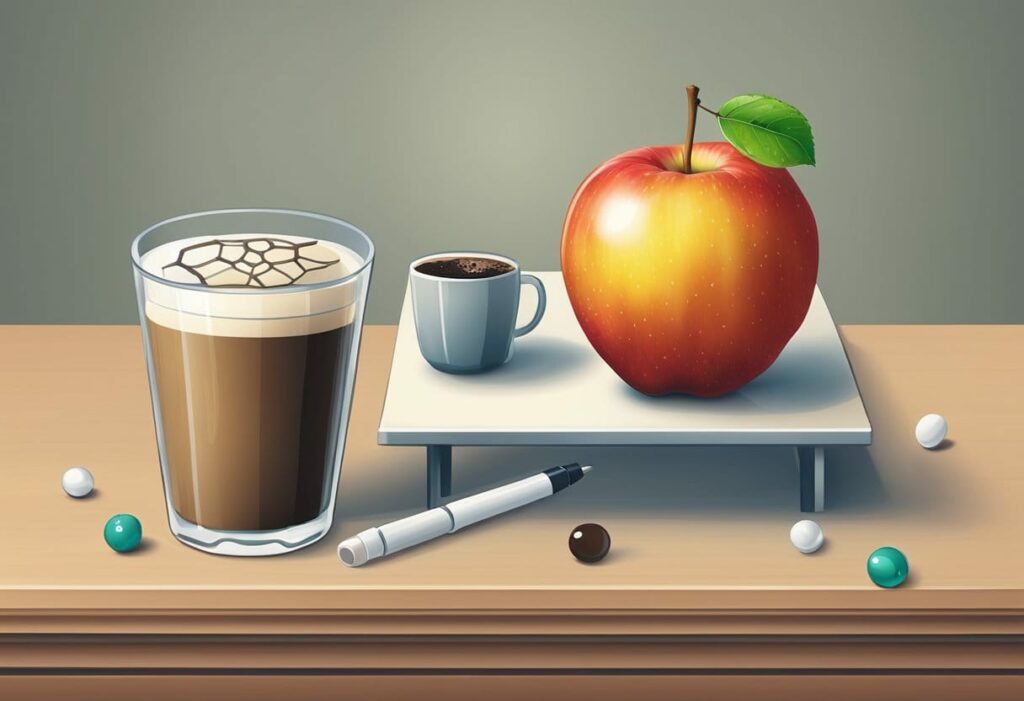
Apples are, however, known for providing a natural energy boost, which might be the reason they’re often associated with caffeine.
This energy boost comes from their natural sugar content, which can help you to kickstart your day without relying on a cup of coffee.
Moreover, there are many other benefits to eating apples, such as their high fiber content, which can help with digestion and promote a feeling of fullness.
Key Takeaways
- Apples do not contain caffeine, but they provide a natural energy boost.
- The energy boost from apples comes from their natural sugar content.
- Apples are beneficial for their fiber content and promote a feeling of fullness.
How Much Caffeine Is In An Apple?

You might have heard that apples can give you an energy boost.
But do they contain caffeine like your cup of coffee? To set the record straight, here’s some information on the caffeine content of apples.
Apples do not contain any caffeine. That’s right, zero! It’s a misconception that apples contain caffeine.
The energy boost from apples actually comes from their sugar content. In fact, an average small apple has about 13 grams of sugar.
Now, let’s talk about the type of sugar in apples.
They’re mainly composed of simple sugars such as fructose, sucrose, and glucose, as well as 4.37 grams of fiber.
These simple sugars can provide you with a quick burst of energy.
However, it’s important not to confuse the energy from sugar and the energy from caffeine.
Caffeine is a stimulant that works on your brain and nervous system, while the sugar from apples provides a more natural energy source.
So an apple might feel like it’s giving you the same energy as your coffee, but it’s important to remember that apples do not contain any caffeine.
You’re experiencing an energy boost from the sugar and overall nutrients in apples, not any actual caffeine content.
Enjoy your apples as a refreshing and energy-packed snack, but keep in mind that their power comes from the natural sugars, not the caffeine you find in coffee!
Comparing Apples with Common Caffeinated Products
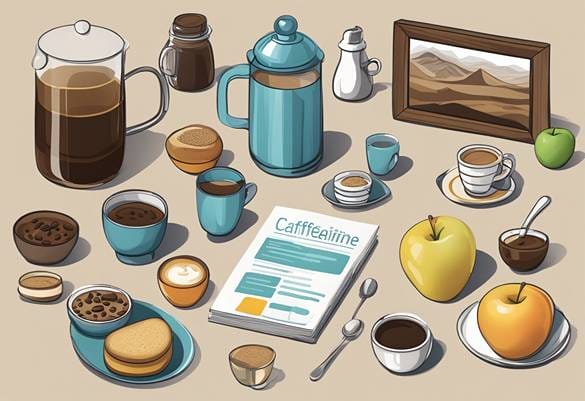
Coffee and Tea
When it comes to caffeine, your morning cup of coffee or tea is undoubtedly a front runner.
A 6 oz serving of instant coffee has about 30mg of caffeine, while brewed coffee can contain slightly more, ranging from 30 to 90mg.
Comparatively, apples contain no caffeine at all, but they can still provide a boost of energy from their natural sugars and fiber content.
On the tea side, you’ll generally find less caffeine than in coffee. A cup of black tea, for instance, contains around 40 to 70mg of caffeine, depending on the strength and preparation.
Green tea comes in even lower, with about 20 to 45mg per cup.
Soda and Energy Drinks
Soda is another popular source of caffeine, but the content can vary widely between brands.
For example, a 12 fl oz can of cola may contain 30 to 50mg of caffeine. Other sodas, like root beer, typically don’t have any caffeine.
Energy drinks, however, pack quite a punch in the caffeine department.
A 16 fl oz can of a popular energy drink might contain 160mg of caffeine or more!
That amount can be even higher for some products, so it’s essential to read labels and consume them responsibly.
Just remember that while apples don’t have any caffeine, they can still provide a slow-release energy boost through their natural sugar, fructose, and fiber.
So, you might consider combining apples with your favorite caffeinated beverage for a more balanced and sustained energy boost throughout the day.
Nutritional Profile of Apples
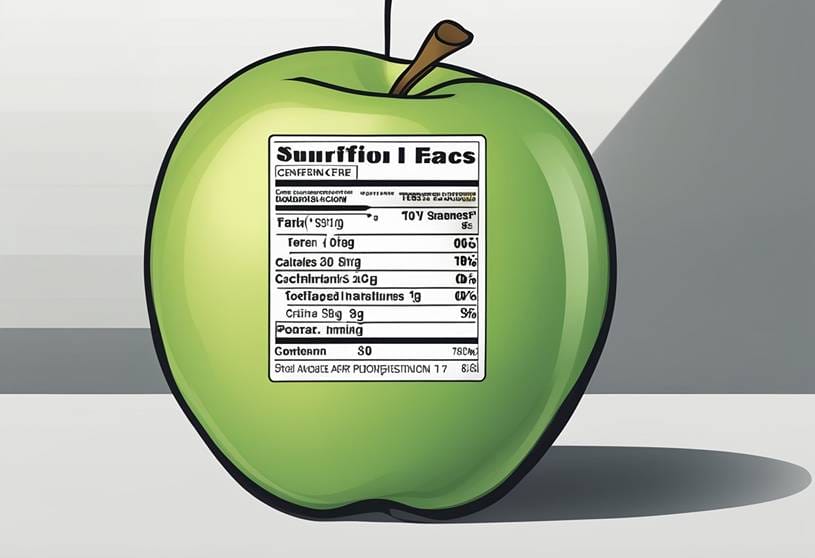
Sugar, Fiber, and Carbohydrates
Apples are a deliciously healthy snack, providing you with a good amount of carbs and fiber.
In a medium-sized apple, you’ll find about 25.1 grams of carbohydrates, with 19 grams of sugar, mostly in the form of fructose.
Don’t worry, though; the natural sugars in apples are much healthier than the refined ones found in processed foods.
Besides the sugar, one of the best things about apples is their fiber content.
A medium apple has 4.37 grams of fiber, which includes both soluble and insoluble types.
One of the soluble fibers in apples is pectin, known for its various health benefits.
Simply put, fiber is great for your digestion and keeping you full for longer.
Vitamin C and Other Antioxidants
You probably already know that oranges are packed with vitamin C, but did you know apples also contain a decent amount of this nutrient?
In one medium apple, you’ll find approximately 9.2 milligrams of vitamin C, offering a nice little boost to your immune system.
Apples are also full of antioxidants that help protect your cells from damage. Some of these antioxidants include quercetin and phytochemicals.
Additionally, apples provide you with a variety of essential vitamins and minerals, such as potassium, which is great for supporting your overall health.
So next time you’re in the mood for a snack, grab an apple and enjoy the tasty nutrients it has to offer!
Understanding Caffeine
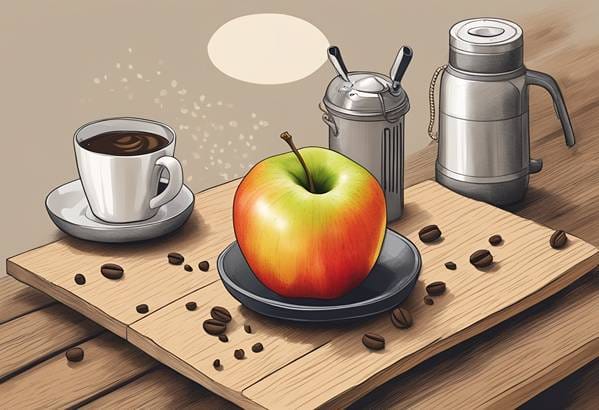
Effects on the Body
Caffeine is a natural stimulant that can boost your energy levels and help you fight drowsiness.
When you consume caffeine, it blocks a neurotransmitter called adenosine, which is responsible for making you feel sleepy.
This leads to an increase in the activity of your nervous system, giving you that much-needed energy boost.
However, too much caffeine can make you feel jittery and anxious. It’s essential to consume it in moderation to avoid experiencing these negative side-effects.
Caffeine also has a rather complex relationship with sleep, as it can interfere with your ability to fall asleep and, in some cases, reduce its overall quality.
Caffeine in Diet
Caffeine can be found in a variety of foods and beverages, including coffee, tea, and soft drinks.
The amount of caffeine in these products varies greatly.
For example, an 8 oz cup of brewed coffee contains about 95 mg of caffeine, while a typical cup of tea has about 50 to 100 mg weight.
Here are some common sources of caffeine and the approximate amount contained in each:
- Brewed coffee: 95 mg per 8 oz
- Tea: 50-100 mg per cup
- Soft drinks: 100-200 mg per typical bottle
Some of the components in caffeinated beverages, such as catechins and chlorogenic acid, are known for their antioxidant properties and potential benefits for heart health.
Antioxidants help protect your body from damage caused by free radicals, which have been linked to various diseases, including cancer and heart disease.
Incorporating caffeine into your diet can provide you some health benefits. But remember, moderation is key.
Consuming too much caffeine can lead to negative effects on your nervous system and metabolism, leaving you feeling jittery and anxious.
So, enjoy and love your caffeinated beverages responsibly and pay attention to how your body reacts to them.
Final Words
The rumor that apples can provide as much energy as a typical cup of coffee is an interesting one, especially considering the way caffeine affects your body.
Unlike coffee, which contains high caffeine levels, such as around 100 mg of caffeine per serving, apples do not contain caffeine.
However, apples give a different kind of energy boost, primarily due to their sugar content.
Apples contain sugar, with a medium-sized apple having about 19 grams of natural sugar dose.
This sugar, along with other nutrients in apples, can give you more energy, especially when consumed at the right time of day.
The natural sugars in apples are released slowly into the bloodstream, helping to keep blood sugar levels stable and providing a steady source of energy, without the crash often associated with high caffeine or sugary products.
While consuming an apple won’t wake you up in the same way as a cup of black coffee or a caffeine coffee blend, it’s a healthier alternative for those looking to avoid the jittery effects and potential insomnia associated with caffeine intake.
Apples are low in calories, high in fiber, and beneficial for gut health, making them an excellent choice for those looking to maintain a balanced diet.
In conclusion, while apples and caffeine are different in their energy-giving properties, apples can be a great way to boost your alertness and stamina naturally.
They provide a crisp, naturally occurring sweetness that can stimulate your senses and give your body a gentle kick of energy.
So, the next time you need a quick pick-me-up, you might be lucky to consider reaching for an apple instead of a packet of caffeine coffee.
Remember, balance is key in diet and health, and apples offer a good alternative to high-caffeine options, keeping you alert without adversely affecting your sleep patterns or causing a crash in energy levels.
Frequently Asked Questions
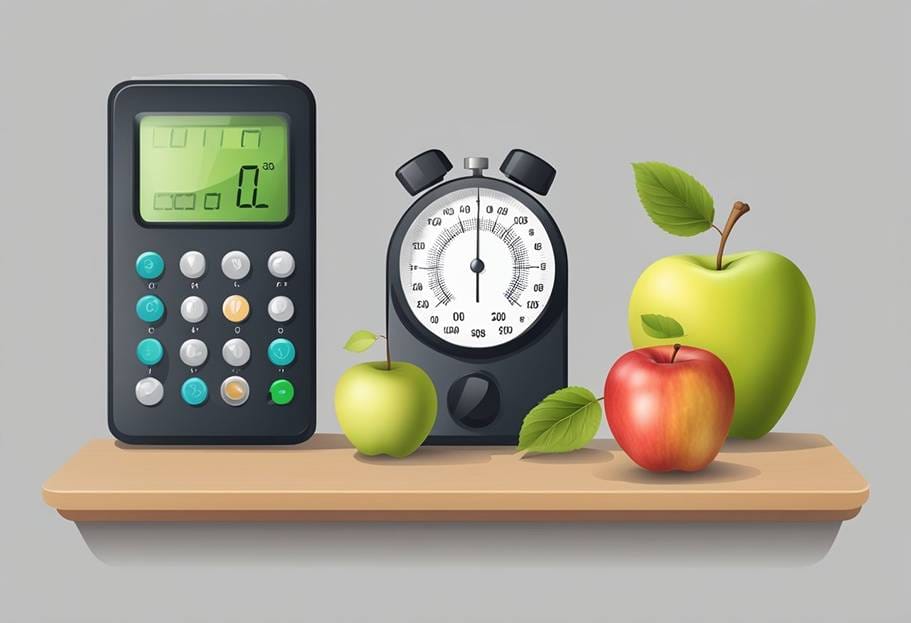
Does apple juice contain any caffeine?
No, apple juice does not contain any caffeine. Apples and apple juice are caffeine-free, making them a great option for those looking to avoid the stimulant.
Can munch on an apple compare to my morning coffee in terms of energy?
While apples don’t have any caffeine like coffee, they do contain natural sugars and fiber that can give you a sustained energy boost throughout the day.
Starting your day with an apple and waiting 90 minutes before enjoying your coffee may provide the most energizing benefits.
Is it true that eating an apple can prevent sleep, similar to drinking coffee?
Apples don’t contain caffeine, which is known to interrupt sleep. However, the natural sugars in apples can provide a slight energy boost.
This effect is not comparable to that of caffeine and is unlikely to prevent sleep.
What fruits have caffeine in them?
There are no common fruits that naturally contain caffeine.
Caffeine is primarily found in products like coffee, tea, and chocolate, derived from plants like coffee beans, tea leaves, and cacao beans.
Are apples a significant source of caffeine?
Apples do not contain any caffeine. Any claims suggesting that apples have caffeine are incorrect.
They can still provide a natural energy boost due to their sugar content and fiber, but they don’t have the stimulant effects of caffeine and do not give you more energy than coffee.
Does a green apple have more caffeine than other apples?
No, green apples, like all apple varieties, do not contain any caffeine.
Their energy-boosting effects come from their sugar and fiber content, not from caffeine.

